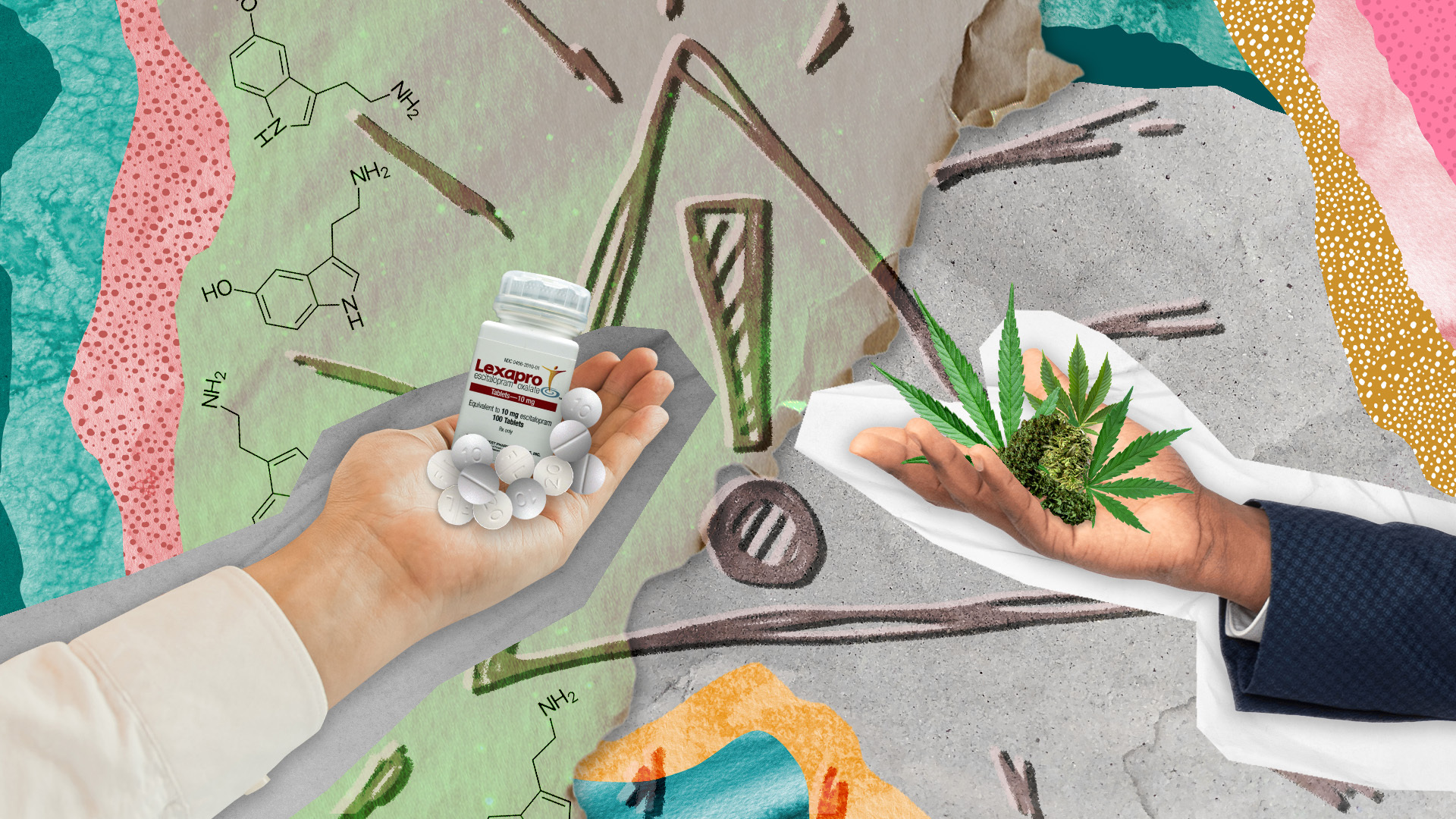
This article was originally published on Veriheal.com
In the ever-evolving world of health and wellness, understanding the interactions between various substances, especially those that affect our mental health, is paramount. Two such substances, increasingly at the center of discussion, are cannabis and Lexapro. Both are widely used for their therapeutic and antidepressant properties.
Cannabis, a plant that has been part of human civilization for millennia, has gained widespread acceptance for its potential medical benefits. Its two main therapeutic components, THC and CBD, are metabolized similarly but have distinct effects on serotonin pathways.
When patients use THC or CBD with an antidepressant medication like Lexapro, it’s essential to understand any potential risks and benefits associated with their drug interactions. In an era where self-medication is rampant, this understanding is more crucial than ever to ensure that patients make safe and informed choices about their health. Of course, speaking to a healthcare professional about your specific questions and options is the safest course of action.
Understanding how cannabis and Lexapro interact begins with understanding how each substance affects the brain individually.
Lexapro, known generically as escitalopram, is a medication that falls under the class of drugs known as selective serotonin reuptake inhibitors (SSRIs). It’s a popular and frequently prescribed medicine designed and FDA-approved to combat the debilitating effects of:
It also has off-label uses for:
Lexapro functions by restoring the balance of serotonin—a neurotransmitter that carries signals between brain cells. Serotonin plays a crucial role in mood regulation, digestion, nausea, appetite, sexual function, and sleep, among other functions. By blocking the reabsorption of serotonin in the brain (serotonin reuptake), Lexapro helps to elevate mood, reduce depression and anxiety, and contribute towards overall mental well-being.
However, like all medications, it can have side effects and may cause adverse effects when mixed with other substances – a critical consideration that users must be aware of.
Research has begun to uncover potential antidepressant effects of cannabis, strains explicitly abundant in cannabidiol (CBD). According to a 2020 clinically-focused review in BMC Psychiatry, CBD may interact with serotonin receptors in the brain, which are vital in managing depression symptoms. THC may also influence serotonin receptors, but it also suggests that patients who are experiencing major depressive disorder or low mood avoid high THC levels.
Furthermore, the study suggests that CBD may also enhance the endocannabinoid system. CBD can potentially increase feel-good and antidepressant endocannabinoids like anandamide. It may also reduce inflammation and oxidative stress, which are also implicated in depression and chronic pain. However, further investigations are needed to draw hard conclusions.
When discussing the interaction of medical cannabis use and Lexapro, it’s crucial to understand their metabolism in the liver.
The liver is the primary site for drug metabolism, and both Lexapro and cannabis are metabolized through the same system – the cytochrome P450 (CYP) enzyme system. The CYP2C19 enzyme primarily metabolizes Lexapro, while the psychoactive cannabinoid of cannabis, tetrahydrocannabinol (THC), is metabolized mainly by the CYP2C9 and CYP3A4 enzymes. However, cannabis is known to slow down (inhibit) these enzymes, potentially leading to an increased concentration of Lexapro in the blood.
This can heighten the effects and side effects of Lexapro, potentially increasing the risk of conditions such as serotonin syndrome, a potentially life-threatening condition characterized by agitation, muscle rigidity, hallucinations, rapid heart rate, and high body temperature.
Furthermore, it is important to note that individual reactions can significantly vary due to factors such as:
Therefore, patients should never mix cannabis with prescription medications like Lexapro without consulting a healthcare provider. This advice is particularly crucial for those with a history of mental health conditions or substance misuse. Ultimately, each person’s health journey is unique, and what works for one might not work for another, emphasizing the importance of personalized advice and treatment.
Theoretically, both cannabis and Lexapro may affect serotonin levels in the brain. For instance, taking Lexapro increases serotonin via its reuptake inhibition, and some research suggests that THC, the active compound in cannabis, may also influence serotonin levels. CBD is also known to directly target serotonin receptors to cause antidepressant and antianxiety effects.
It is, therefore, believed that the overlap between these substances could enhance their therapeutic properties. But it also creates the risk of serotonin syndrome, especially if the doses are high or in patients with poor metabolism.
Additionally, Lexapro and some SSRIs may cause an abnormal heart rhythm (QTc prolongation), which could worsen with increasing Lexapro levels caused by cannabis.
The potential interaction between cannabis and Lexapro emphasizes the necessity of open, informed discussion about medication and supplement choices with a healthcare provider. While both substances have been found to provide therapeutic benefits, their combined use warrants caution and careful consideration.
Studies directly examining THC, CBD, and SSRIs like Lexapro are lacking. Still, it’s crucial to remember that research in this area is ongoing, and what is known today may be refined or challenged by new findings tomorrow.
Therefore, we encourage our readers to stay updated and informed, but above all, to prioritize safety when making health decisions. An honest dialogue with your healthcare provider, a comprehensive understanding of your health, and an informed decision-making process are the best strategies to ensure that your path to well-being is as safe and effective as possible.
Note: The content on this page is for informational purposes only and is not intended to be professional medical advice. Do not attempt to self-diagnose or prescribe treatment based on the information provided. Always consult a physician before making any decision on the treatment of a medical condition.
No Information on MarijuanaDoctors.Com should be used to diagnose, treat, prevent or cure any disease or condition. You can view our Full Disclaimer here.